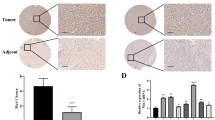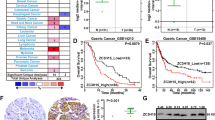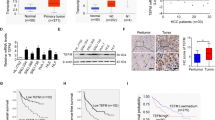Abstract
During the process of long-term carcinogenesis, cells accumulate many mutations. Deregulated genes expression causes profound changes in cell proliferation, which is one of the hallmarks of HCC. A comprehensive understanding of these changes will contribute to the molecular mechanism of HCC progression. Through clinical sample analysis, we found that TMEM220 is downregulated in tumor and lower levels of TMEM220 is associated with poor prognosis in HCC patients. Through overexpressing TMEM220 in HCC cell lines, we found that the proliferation of cancer cells was significantly slowed down and metastasis was significantly reduced. For further study of its molecular mechanism, we performed a reverse-phase protein array (RPPA). The results suggest that phenotypic changes caused by TMEM220 in HCC cells might be associated with FOXO and PI3K-Akt pathways. Mechanism studies showed that overexpression of TMEM220 could regulate β-catenin and FOXO3 transcriptional activity by altering their subcellular localization, affecting the expression of downstream gene p21 and SNAIL, and ultimately reducing the progression of HCC. Altogether, our study proposes a working model in which upregulation of TMEM220 expression alters the genes expression involved in cell proliferation, thereby inhibiting HCC progression, which suggests that TMEM220 might serve as a clinical biomarker.
This is a preview of subscription content, access via your institution
Access options
Subscribe to this journal
Receive 12 print issues and online access
$259.00 per year
only $21.58 per issue
Buy this article
- Purchase on Springer Link
- Instant access to full article PDF
Prices may be subject to local taxes which are calculated during checkout





Similar content being viewed by others
Availability of data and material
The datasets generated and/or analyzed during the current study are involved in this published article (and its supplementary information files) or available on published databases (TCGA).
References
Jemal A, Bray F, Center MM, Ferlay J, Ward E, Forman D. Global cancer statistics. CA: Cancer J Clin. 2011;61:69–90.
Hrasovec S, Hauptman N, Glavac D, Jelenc F, Ravnik-Glavac M. TMEM25 is a candidate biomarker methylated and down-regulated in colorectal cancer. Dis Markers. 2013;34:93–104.
Zou J, Li Z, Deng H, Hao J, Ding R, Zhao M. TMEM213 as a novel prognostic and predictive biomarker for patients with lung adenocarcinoma after curative resection: a study based on bioinformatics analysis. J Thorac Dis. 2019;11:3399–410.
Geng Q, Chen X, Chen N. Transmembrane protein 88 exerts a tumor-inhibitory role in thyroid cancer through restriction of Wnt/beta-catenin signaling. Exp Cell Res. 2020;395:112193.
Wang Y, Zhang Y, Herman JG, Linghu E, Guo M. Epigenetic silencing of TMEM176A promotes esophageal squamous cell cancer development. Oncotarget. 2017;8:70035–48.
Kayed H, Kleeff J, Ding J, Hammer J, Giese T, Zentgraf H, et al. Expression analysis of MAC30 in human pancreatic cancer and tumors of the gastrointestinal tract. Histol Histopathol. 2004;19:1021–31.
Malhotra K, Luehrsen KR, Costello LL, Raich TJ, Sim K, Foltz L, et al. Identification of differentially expressed mRNAs in human fetal liver across gestation. Nucleic Acids Res. 1999;27:839–47.
Zhou X, Popescu NC, Klein G, Imreh S. The interferon-alpha responsive gene TMEM7 suppresses cell proliferation and is downregulated in human hepatocellular carcinoma. Cancer Genet Cytogenet. 2007;177:6–15.
Zhao Y, Song K, Zhang Y, Xu H, Zhang X, Wang L, et al. TMEM17 promotes malignant progression of breast cancer via AKT/GSK3beta signaling. Cancer Manag Res. 2018;10:2419–28.
Zhao J, Zhu D, Zhang X, Zhang Y, Zhou J, Dong M. TMEM206 promotes the malignancy of colorectal cancer cells by interacting with AKT and extracellular signal-regulated kinase signaling pathways. J Cell Physiol. 2019;234:10888–98.
Zhang X, Yu X, Jiang G, Miao Y, Wang L, Zhang Y, et al. Cytosolic TMEM88 promotes invasion and metastasis in lung cancer cells by binding DVLS. Cancer Res. 2015;75:4527–37.
Breuhahn K, Schirmacher P. Signaling networks in human hepatocarcinogenesis-novel aspects and therapeutic options. Prog Mol Biol Transl Sci. 2010;97:251–77.
Galuppo R, Maynard E, Shah M, Daily MF, Chen C, Spear BT, et al. Synergistic inhibition of HCC and liver cancer stem cell proliferation by targeting RAS/RAF/MAPK and WNT/beta-catenin pathways. Anticancer Res. 2014;34:1709–13.
Khalaf AM, Fuentes D, Morshid AI, Burke MR, Kaseb AO, Hassan M, et al. Role of Wnt/beta-catenin signaling in hepatocellular carcinoma, pathogenesis, and clinical significance. J Hepatocell Carcinoma. 2018;5:61–73.
Cao F, Yin LX. PAK1 promotes proliferation, migration and invasion of hepatocellular carcinoma by facilitating EMT via directly up-regulating Snail. Genomics. 2020;112:694–702.
Wang Y, Shi J, Chai K, Ying X, Zhou BP. The role of Snail in EMT and tumorigenesis. Curr Cancer Drug Targets. 2013;13:963–72.
Zhang Y, Yuan Y, Zhang Y, Cheng L, Zhou X, Chen K. SNHG7 accelerates cell migration and invasion through regulating miR-34a-Snail-EMT axis in gastric cancer. Cell Cycle. 2020;19:142–52.
Ge YX, Wang CH, Hu FY, Pan LX, Min J, Niu KY, et al. New advances of TMEM88 in cancer initiation and progression, with special emphasis on Wnt signaling pathway. J Cell Physiol. 2018;233:79–87.
Wang H, Zou L, Ma K, Yu J, Wu H, Wei M, et al. Cell-specific mechanisms of TMEM16A Ca(2+)-activated chloride channel in cancer. Mol Cancer. 2017;16:152.
Choi B, Han TS, Min J, Hur K, Lee SM, Lee HJ, et al. MAL and TMEM220 are novel DNA methylation markers in human gastric cancer. Biomarkers. 2017;22:35–44.
Wang Z, Wu Q, Feng S, Zhao Y, Tao C. Identification of four prognostic LncRNAs for survival prediction of patients with hepatocellular carcinoma. PeerJ. 2017;5:e3575.
Tibes R, Qiu Y, Lu Y, Hennessy B, Andreeff M, Mills GB, et al. Reverse phase protein array: validation of a novel proteomic technology and utility for analysis of primary leukemia specimens and hematopoietic stem cells. Mol Cancer Therapeut. 2006;5:2512–21.
Liu L, Zhu XD, Wang WQ, Shen Y, Qin Y, Ren ZG, et al. Activation of beta-catenin by hypoxia in hepatocellular carcinoma contributes to enhanced metastatic potential and poor prognosis. Clin Cancer Res. 2010;16:2740–50.
Yuan K, Xie K, Lan T, Xu L, Chen X, Li X, et al. TXNDC12 promotes EMT and metastasis of hepatocellular carcinoma cells via activation of beta-catenin. Cell Death Differ. 2020;27:1355–68.
Oyer HM, Sanders CM, Kim FJ. Small-molecule modulators of sigma1 and sigma2/TMEM97 in the context of cancer: foundational concepts and emerging themes. Front Pharmacol. 2019;10:1141.
Schmit K, Michiels C. TMEM proteins in cancer: a review. Front Pharmacol. 2018;9:1345.
Li N, Tang B, Jia YP, Zhu P, Zhuang Y, Fang Y, et al. Helicobacter pylori CagA protein negatively regulates autophagy and promotes inflammatory response via c-Met-PI3K/Akt-mTOR signaling pathway. Front Cell Infect Microbiol. 2017;7:417.
Stevenson NJ, Bourke NM, Ryan EJ, Binder M, Fanning L, Johnston JA, et al. Hepatitis C virus targets the interferon-alpha JAK/STAT pathway by promoting proteasomal degradation in immune cells and hepatocytes. FEBS Lett. 2013;587:1571–8.
Rotow JK, Gui P, Wu W, Raymond VM, Lanman RB, Kaye FJ, et al. Co-occurring alterations in the RAS-MAPK pathway limit response to MET inhibitor treatment in MET Exon 14 skipping mutation-positive lung cancer. Clin Cancer Res. 2020;26:439–49.
Gomes DA, Rodrigues MA, Leite MF, Gomez MV, Varnai P, Balla T, et al. c-Met must translocate to the nucleus to initiate calcium signals. J Biol Chem. 2008;283:4344–51.
Picotto G, Morse LR, Nguyen N, Saltzman J, Battaglino R. TMEM176A and TMEM176B are candidate regulators of inhibition of dendritic cell maturation and function after chronic spinal cord injury. J Neurotrauma. 2020;37:528–33.
Tian Y, Qi P, Hu X. Downregulated FOXO3a associates with poor prognosis and promotes cell invasion and migration via WNT/beta-catenin signaling in cervical carcinoma. Front Oncol. 2020;10:903.
Liu H, Yin J, Wang H, Jiang G, Deng M, Zhang G, et al. FOXO3a modulates WNT/beta-catenin signaling and suppresses epithelial-to-mesenchymal transition in prostate cancer cells. Cell Signal. 2015;27:510–8.
Acknowledgements
We thank Professor Tie-lin Yang, Yan Guo at Xi’an Jiaotong University for helpful data analysis. This work was supported by the National Natural Science Foundation of China (Grant no. 61372151 and Grant no. 31570917).
Author information
Authors and Affiliations
Contributions
Conception and design: X.Y.L. and H.Q.Z.; Acquisition of data (provided animals, acquired and managed patients, provided facilities, etc.): T.L., L.G., G.B.T., B.H., J.W., L.L.H., M.Y.L., Y.X.B.; Analysis and interpretation of data (e.g., statistical analysis, biostatistics, computational analysis): T.L., G.L., J.W., B.H., J.P.W.; Technical, or material support (reporting or organizing data, constructing databases): S.S.D.
Corresponding author
Ethics declarations
Competing interests
The authors declare no competing interests.
Ethics approval and consent to participate
Each patient consented to the approved protocol which was confirmed by the Institute Research Ethics Committee at The First Affiliated Hospital, Xiangya Hospital, and Shanghai Tenth People’s Hospital.
Consent for publication
All authors have agreed to publish this manuscript.
Additional information
Publisher’s note Springer Nature remains neutral with regard to jurisdictional claims in published maps and institutional affiliations.
Supplementary information
Rights and permissions
About this article
Cite this article
Li, T., Guan, L., Tang, G. et al. Downregulation of TMEM220 promotes tumor progression in Hepatocellular Carcinoma. Cancer Gene Ther 29, 835–844 (2022). https://doi.org/10.1038/s41417-021-00370-0
Received:
Revised:
Accepted:
Published:
Issue Date:
DOI: https://doi.org/10.1038/s41417-021-00370-0



